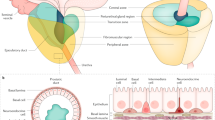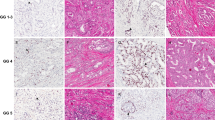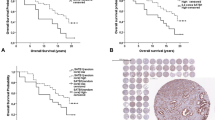Abstract
The disease progression and rate of cancer death were analyzed in 52 patients with stage A prostate cancer who underwent transurethral resection of the prostate (TURP) or retropubic subcapsular prostatectomy (SCP) between 1987 and 1998. We performed immunohistochemistry on 16 patients to determine the correlation between the expression of the tumor metastasis suppressor gene KAI1 and the subsequent progression of stage A prostate cancer. Nineteen and 33 of the patients had cancer at stage A1 and stage A2, respectively, and their subsequent courses were followed for an average of 53.7 months (24–134 months). Progression to clinical cancer was found in six patients (one with stage A1, and five with stage A2). This progression was evident 40.8 months (5–80 months) after TURP or SCP. Four (66.7%) of the patients died of cancer progression (average 31 months) after prostatectomy. All four patients had stage A2, poorly differentiated adenocarcinoma, and had been followed with administration of diethylstilbestrol diphosphate (DES-P). The disease-free patients (n=10) showed overexpression of KAI1 protein, compared to those with disease progression (n=6). These results indicate that progression arose mainly in the patients with stage A2 cancer, and that poorly differentiated, focal and weak expression of KAI1 protein is highly associated with disease progression. It is suggested that patients in this group should be treated with immediate total androgen blockade, radiation, or radical prostatectomy after diagnosis.
.
This is a preview of subscription content, access via your institution
Access options
Subscribe to this journal
Receive 4 print issues and online access
$259.00 per year
only $64.75 per issue
Buy this article
- Purchase on Springer Link
- Instant access to full article PDF
Prices may be subject to local taxes which are calculated during checkout
Similar content being viewed by others
References
Geller J Clinical review: 67. Approach to chemoprevention of prostate cancer. J Clin Endocrinol Metab 1995 80 717
Corder EH, Chute CG, Guess HA Prostate cancer in Rochester, Minnesota (USA), from 1935 to 1989: increases in incidence related to more complete ascertainment. Cancer Causes and Control 1994 5 207–214
Cantrell BB et al Pathological factors that influence prognosis in stage A prostatic cancer: the influence of extent versus grade. J Urol 1981 125 516–520
Lowe BA, Listron MB Incidental carcinoma of the prostate: an analysis of the predictors of progression. J Urol 1986 140 1340–1344
Byar DP The Veterans Administration Cooperative Urological Research Group. Survival of patients with incidentally found microscopic cancer of the prostate: results of a clinical trial of conservative treatment. J Urol 1972 108 908
Dong JT et al Down-regulation of the KAI1 metastasis suppressor gene during the progression of human prostatic cancer infrequently involves gene mutation or allelic loss. Cancer Res 1996 56 4387–4390
Ueda T et al Expression of the KAI1 protein in benign prostatic hyperplasia and prostate cancer. Am J Pathol 1996 149 1435–1440
Adachi M et al Correlation of KAI1/CD82 gene expression with good prognosis in patients with non-small cell lung cancer. Cancer Res 1996 56 1751–1755
Wei LL et al Analysis of KAI1 mRNA expression in human breast cancer cell lines. Proc Am Assoc Cancer Res 1996 37 76
Yu Y et al Loss of KAI1 messenger RNA expression in both high-grade and invasive human bladder cancers. Clin Cancer Res 1997 3 1045–1049
Guo X et al KAI1 expression is up-regulated in early pancreatic cancer and decreased in the presence of metastases. Cancer Res 1996 56 4876–4880
General Rules for Clinical and Pathological Studies on Prostate Cancer 2nd ed (in Japanese). Kanehara Pub. Co: Tokyo 1992
Berney CR et al Overexpression of nm23 protein assessed by color video image analysis in metastatic colorectal cancer: correlation with reduced patient survival. World J Surg 1998 22 484–490
Kaplan EL, Meier P Non-parametric estimation from incomplete observations. J Amer Stat Ass 1958 53 457
Blute ML, Zincke H, Farrow GM Long-term follow-up of stage A adenocarcinoma of the prostate. J Urol 1986 136 840–843
McNeal JE et al Stage A versus stage B adenocarcinoma of the prostate: morphological comparison and biological significance. J Urol 1988 139 61–65
Dong JT et al KAI1, a metastasis suppressor gene for prostate cancer in human chromosome 11p11.2. Science 1995 268 884–886
Author information
Authors and Affiliations
Rights and permissions
About this article
Cite this article
Tozawa, K., Akita, H., Kawai, N. et al. KAI1 expression can be a predictor of stage A prostate cancer progression. Prostate Cancer Prostatic Dis 4, 150–153 (2001). https://doi.org/10.1038/sj.pcan.4500521
Received:
Revised:
Accepted:
Published:
Issue Date:
DOI: https://doi.org/10.1038/sj.pcan.4500521
Keywords
This article is cited by
-
Downregulation of KAI1 mRNA in localised prostate cancer and its bony metastases does not correlate with p53 overexpression
Prostate Cancer and Prostatic Diseases (2003)



